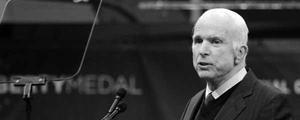GALLUP NEWS SERVICE
PRINCETON, NJ -- Seventeen months before the nation chooses its next president, the political environment favors the Democratic Party. Prior Gallup analyses have shown that the Democrats have a clear advantage in party identification among the voting-age population, that Americans view the Democratic Party more favorably than the Republican Party, and that the basic indicators of the nation's mood are quite negative -- something that typically bodes well for the party out of the White House. Even so, Democratic presidential candidates have not fared all that well when matched up against Republican candidates in trial heat questions on the 2008 election. In the latest Gallup Poll update on these trial heats, the Democratic candidate has a slight edge in each of nine hypothetical pairings tested, but a statistically significant lead in only three of these.
The June 11-14 poll matched the three leading announced Democratic presidential candidates -- Hillary Clinton, Barack Obama, and John Edwards -- against each of the three leading announced Republican candidates -- Rudy Giuliani, John McCain, and Mitt Romney.
Given the sample size of 927 registered voters in the poll, a candidate would need an advantage of seven percentage points to have a statistically significant lead. The margin of error associated with the "lead" or "gap" is slightly larger than it is for an estimated percentage from the poll because each candidate's percentage has a margin of error associated with it.
The Democratic candidates achieve the significance threshold in their matchups with Romney, the former Massachusetts governor. Edwards leads Romney by 29 percentage points (61% to 32%), Obama leads him by 21 points (57% to 36%), and Clinton leads him by 13 points (53% to 40%).
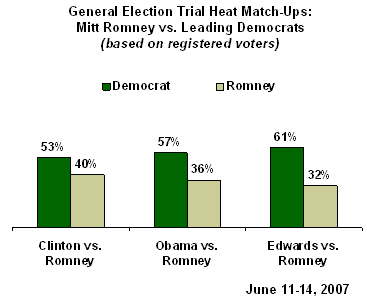
Romney's relatively poor performance is partly because he is still not well known by the public. A Gallup Poll conducted in early June found that half of Americans had never heard of Romney or were not familiar enough with him to have a positive or negative opinion of him.
The other Republicans -- McCain and Giuliani -- would appear to present tougher match-ups for the Democrats at this point. Giuliani is the most positively rated candidate of either party, with a 57% favorable rating in the latest Gallup survey. And while McCain is not rated as favorably overall (47%), he has impressive cross-appeal because he is rated much more positively than negatively by independents, and only slightly more negatively than positively by Democrats.
All three match-ups pitting McCain against the leading Democrats are too close to call, though Edwards' six-point lead just barely misses attaining statistical significance. Clinton has a three-point edge over the Arizona senator and Obama has a two-point advantage.
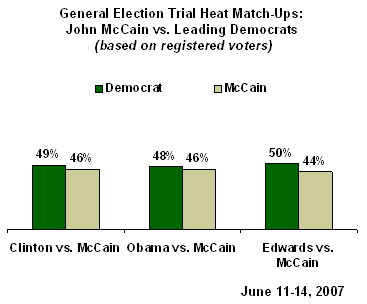
Despite Giuliani's broad popularity, the three Democrats are quite competitive with him in national test elections. All three Democrats get 50% support among registered voters when matched up against Giuliani, with Giuliani getting 46% against Clinton and 45% against both Edwards and Obama. Again, none of these gaps in favor of the Democrats are statistically significant.
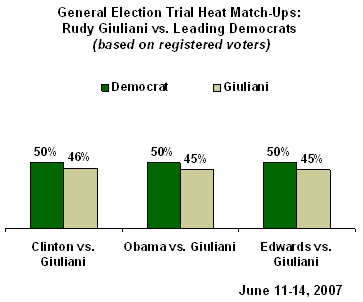
Prior Results
Gallup has run several trial heats this year between Clinton and Giuliani -- the front-runners for their respective parties' nominations -- based on national polling numbers, and this is the first poll in which Giuliani does not have a slight edge over Clinton. His advantages in previous surveys ranged from two to seven points, with only the seven-point advantage being statistically meaningful.
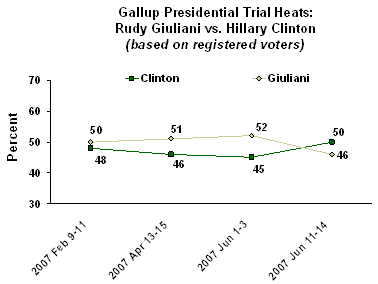
Giuliani held a significant lead over Obama, 52% to 43%, in a February pairing of those two candidates. That poll was conducted in a more favorable environment for Giuliani, when he had a 66% favorable rating, nine points higher than his current score. Obama's favorable rating in February is the same as it is now, 53%. Obama is also slightly better known now than he was in February.
There has been essentially no change this year in the match-ups of McCain versus Clinton or Obama. In February, it was Clinton over McCain by 50% to 47% and Obama and McCain tied at 48%.
History
Since World War II, there have been only three elections that replaced a president who had served two four-year terms -- in 1960, 1988, and 2000. (In 1952 and 1968, the incumbents were eligible for re-election after serving less than two full terms but declined to run.) Given the small number of similar elections, and the differing outcomes of these, the historical data do not offer much guidance as to what might happen in 2008. But the data do show that it has not been unusual for the party out of power to lead for much of the year before the "open-seat" election.
George W. Bush held a statistically significant lead over Al Gore in almost every trial heat poll conducted in 1999. Republican Bush went on to win a disputed victory over Gore in the Electoral College to replace the departing Democrat Bill Clinton.
In 1987, Democratic front-runner Gary Hart led the elder George Bush for the first several months of the year. Bush took over the lead in late May after news of Hart's extramarital affair derailed his campaign, and polled better than Hart, Jesse Jackson, and Mario Cuomo in late 1987. Bush relinquished the lead the following spring to his eventual challenger Michael Dukakis, before moving back ahead after the Republican convention and eventually being elected by a comfortable margin to succeed Republican Ronald Reagan as president.
In 1959, the various Democratic candidates led for much of the first part of the year, but the tide shifted in the Republicans' favor for much of the latter part in that year's presidential preference polling. Democrat John Kennedy won a razor-thin victory over Republican Richard Nixon the following year in the contest to succeed Republican Dwight Eisenhower.
Survey Methods
These results are based on telephone interviews with a randomly selected national sample of 1,007 adults, aged 18 and older, conducted June 11-14, 2007. For results based on this sample, one can say with 95% confidence that the maximum error attributable to sampling and other random effects is ±3 percentage points.
For results based on the sample of 927 registered voters, the maximum margin of sampling error is ±4 percentage points.
In addition to sampling error, question wording and practical difficulties in conducting surveys can introduce error or bias into the findings of public opinion polls.
Thinking now about the general election for president, which will be held in November 2008. Suppose the election were being held today.
Q.20/20A THROUGH Q.28/28A ROTATED
20. If Hillary Clinton were the Democratic Party's candidate and Rudy Giuliani were the Republican Party's candidate, who would you vote for -- [ROTATED: Hillary Clinton, the Democrat (or) Rudy Giuliani, the Republican]?
20A. (Asked of those who are undecided) As of today, do you lean more toward -- [ROTATED: Clinton, the Democrat (or) Giuliani, the Republican]?
|
|
|
|
OTHER
|
NEITHER
|
No
|
|
Registered voters |
% |
% |
% |
% |
% |
|
2007 Jun 11-14 |
50 |
46 |
* |
2 |
1 |
|
2007 Jun 1-3 |
45 |
52 |
1 |
2 |
1 |
|
2007 Apr 13-15 |
46 |
51 |
* |
2 |
1 |
|
2007 Feb 9-11 |
48 |
50 |
-- |
1 |
1 |
|
2005 Jul 25-28 |
45 |
50 |
1 |
2 |
2 |
|
|
|
|
|
|
|
|
National adults |
|
|
|
|
|
|
2007 Jun 11-14 |
50 |
45 |
* |
3 |
1 |
|
2007 Jun 1-3 |
45 |
50 |
1 |
2 |
2 |
|
2007 Apr 13-15 |
46 |
51 |
* |
2 |
1 |
|
2007 Feb 9-11 |
49 |
48 |
-- |
1 |
1 |
|
2005 Jul 25-28 |
44 |
51 |
* |
2 |
3 |
|
(vol.) = Volunteered response |
|||||
|
* Less than 0.5% |
|||||
21. If Hillary Clinton were the Democratic Party's candidate and John McCain were the Republican Party's candidate, who would you be more likely to vote for -- [ROTATED: Hillary Clinton, the Democrat (or) John McCain, the Republican]?
21A. (Asked of those who are undecided) As of today, do you lean more toward -- [ROTATED: Clinton, the Democrat (or) McCain, the Republican]?
|
|
|
|
OTHER
|
NEITHER
|
No
|
|
Registered voters |
% |
% |
% |
% |
% |
|
2007 Jun 11-14 |
49 |
46 |
* |
3 |
2 |
|
2007 Feb 9-11 |
50 |
47 |
* |
1 |
1 |
|
2005 Oct 21-23 |
43 |
53 |
1 |
2 |
1 |
|
2005 Jul 25-28 |
45 |
50 |
-- |
2 |
3 |
|
|
|
|
|
|
|
|
National adults |
|
|
|
|
|
|
2007 Jun 11-14 |
50 |
45 |
* |
3 |
2 |
|
2007 Feb 9-11 |
52 |
46 |
* |
1 |
1 |
|
2005 Oct 21-23 |
43 |
53 |
1 |
2 |
1 |
|
2005 Jul 25-28 |
45 |
50 |
-- |
2 |
3 |
|
(vol.) = Volunteered response |
|||||
|
* Less than 0.5% |
|||||
22. If Hillary Clinton were the Democratic Party's candidate and Mitt Romney were the Republican Party's candidate, who would you vote for -- [ROTATED: Hillary Clinton, the Democrat (or) Mitt Romney, the Republican]?
22A. (Asked of those who are undecided) As of today, do you lean more toward -- [ROTATED: Clinton, the Democrat (or) Romney, the Republican]?
|
|
|
|
OTHER
|
NEITHER
|
No
|
|
Registered voters |
|
|
|
|
|
|
2007 Jun 11-14 |
53% |
40 |
* |
4 |
2 |
|
|
|
|
|
|
|
|
National adults |
|
|
|
|
|
|
2007 Jun 11-14 |
53% |
39 |
* |
4 |
2 |
|
(vol.) = Volunteered response |
|||||
|
* Less than 0.5% |
|||||
23. If John Edwards were the Democratic Party's candidate and Rudy Giuliani were the Republican Party's candidate, who would you vote for -- [ROTATED: John Edwards, the Democrat (or) Rudy Giuliani, the Republican]?
23A. (Asked of those who are undecided) As of today, do you lean more toward -- [ROTATED: Edwards, the Democrat (or) Giuliani, the Republican]?
|
|
|
|
OTHER
|
NEITHER
|
No
|
|
Registered voters |
|||||
|
2007 Jun 11-14 |
50% |
45 |
* |
2 |
2 |
|
|
|
|
|
|
|
|
National adults |
|
|
|
|
|
|
2007 Jun 11-14 |
49% |
45 |
* |
3 |
2 |
|
(vol.) = Volunteered response |
|||||
|
* Less than 0.5% |
|||||
24. If John Edwards were the Democratic Party's candidate and John McCain were the Republican Party's candidate, who would you vote for -- [ROTATED: John Edwards, the Democrat (or) John McCain, the Republican]?
24A. (Asked of those who are undecided) As of today, do you lean more toward -- [ROTATED: Edwards, the Democrat (or) McCain, the Republican]?
|
|
|
|
OTHER
|
NEITHER
|
No
|
|
Registered voters |
|
|
|
|
|
|
2007 Jun 11-14 |
50% |
44 |
* |
4 |
2 |
|
|
|
|
|
|
|
|
National adults |
|
|
|
|
|
|
2007 Jun 11-14 |
49% |
43 |
* |
4 |
3 |
|
(vol.) = Volunteered response |
|||||
|
* Less than 0.5% |
|||||
25. If John Edwards were the Democratic Party's candidate and Mitt Romney were the Republican Party's candidate, who would you vote for -- [ROTATED: John Edwards, the Democrat (or) Mitt Romney, the Republican]?
25A. (Asked of those who are undecided) As of today, do you lean more toward -- [ROTATED: Edwards, the Democrat (or) Romney, the Republican]?
|
|
|
|
OTHER
|
NEITHER
|
No
|
|
Registered voters |
|
|
|
|
|
|
2007 Jun 11-14 |
61% |
32 |
* |
3 |
3 |
|
|
|
|
|
|
|
|
National adults |
|
|
|
|
|
|
2007 Jun 11-14 |
60% |
32 |
* |
4 |
4 |
|
(vol.) = Volunteered response |
|||||
|
* Less than 0.5% |
|||||
26. If Barack Obama were the Democratic Party's candidate and Rudy Giuliani were the Republican Party's candidate, who would you be more likely to vote for -- [ROTATED: Barack Obama, the Democrat (or) Rudy Giuliani, the Republican]?
26A. (Asked of those who are undecided) As of today, do you lean more toward -- [ROTATED: Obama, the Democrat (or) Giuliani, the Republican]?
|
|
|
Giuliani |
OTHER
|
NEITHER
|
No
|
|
Registered voters |
% |
% |
% |
% |
% |
|
2007 Jun 11-14 |
50 |
45 |
* |
3 |
2 |
|
2007 Feb 9-11 |
43 |
52 |
* |
2 |
2 |
|
|
|
|
|
|
|
|
National adults |
|
|
|
|
|
|
2007 Jun 11-14 |
49 |
45 |
* |
4 |
2 |
|
2007 Feb 9-11 |
43 |
52 |
* |
2 |
2 |
|
(vol.) = Volunteered response |
|||||
|
* Less than 0.5% |
|||||
27. If Barack Obama were the Democratic Party's candidate and John McCain were the Republican Party's candidate, who would you be more likely to vote for -- [ROTATED: Barack Obama, the Democrat (or) John McCain, the Republican]?
27A. (Asked of those who are undecided) As of today, do you lean more toward -- [ROTATED: Obama, the Democrat (or) McCain, the Republican]?
|
|
|
McCain |
OTHER
|
NEITHER
|
No
|
|
Registered voters |
% |
% |
% |
% |
% |
|
2007 Jun 11-14 |
48 |
46 |
* |
3 |
2 |
|
2007 Feb 9-11 |
48 |
48 |
* |
2 |
2 |
|
|
|
|
|
|
|
|
National adults |
|
|
|
|
|
|
2007 Jun 11-14 |
48 |
45 |
* |
4 |
3 |
|
2007 Feb 9-11 |
47 |
48 |
* |
2 |
3 |
|
(vol.) = Volunteered response |
|||||
|
* Less than 0.5% |
|||||
28. If Barack Obama were the Democratic Party's candidate and Mitt Romney were the Republican Party's candidate, who would you vote for -- [ROTATED: Barack Obama, the Democrat (or) Mitt Romney, the Republican]?
28A. (Asked of those who are undecided) As of today, do you lean more toward -- [ROTATED: Obama, the Democrat (or) Romney, the Republican]?
|
|
|
Romney |
OTHER
|
NEITHER
|
No
|
|
Registered voters |
% |
% |
% |
% |
% |
|
2007 Jun 11-14 |
57 |
36 |
* |
5 |
3 |
|
|
|
|
|
|
|
|
National adults |
|
|
|
|
|
|
2007 Jun 11-14 |
56 |
35 |
* |
5 |
3 |
|
(vol.) = Volunteered response |
|||||
|
* Less than 0.5% |
|||||
